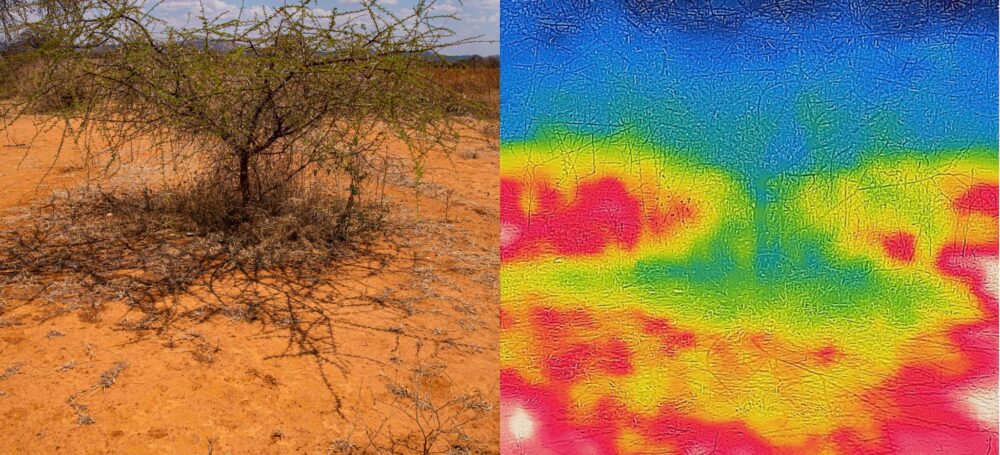Our Champion Farmers teach fellow farmers how to regenerate trees and vegetation on their farmlands and grazing sides. Their engagement is the reason why our regreening efforts are so successful. We train them about Kisiki Hai (FMNR) as well as Rainwater Harvesting, and afterwards they spread the knowledge to their fellow farmers. Each of them trains at least 150 households in three years and then keeps visiting each of them four times a year. That means 600 visits a year! Some
Here at LEAD Foundation, we use Nature-based Solutions to restore degraded landscapes using natural elements while simultaneously improving human livelihoods. Nature-based Solutions benefit both people and the planet. We scale up land restoration efforts that focus on Nature-based Solutions. We focus particularly on agroforestry practices like Kisiki Hai (FMNR) and Rainwater Harvesting practices like digging half moon bunds and rainwater harvesting trenches.
Nature-based solutions are actions that protect, sustainably manage, and restore natural or modified ecosystems, and that effectively and adaptively
LEAD Foundation for the second time has been recognized internationally during the COP28 inDubai for spearheading landscape restoration in Africa through advocating, motivating,promoting and supporting the use of Nature Based Solutions (NBS). In the year 2021 LEADFoundation was recognized and announced during the COP26 which took place in Glasgow,Scotland as one among the top 20 organizations in African continent leading in landscaperestoration.During this year COP28 in Dubai, LEAD Foundation was officially admitted as an observerorganization to the United Nations Framework Convention
We have been restoring landscapes using Kisiki Hai/FMNR technique for over ten years now and have restored more than 14 million trees. We always work closely together with our beloved farmers, who at the same time benefit from the regreening efforts and are responsible for the success of our regreening projects. Many of them told us not only about higher crop yields but also that they feel healthier and that their environment has become cooler. They can sit and rest under
We believe that changing children’s mindsets will impact changes in the entire family, the community on a large scale and the future generation. We want our regreening efforts to be sustainable and long-lasting, which is why we don’t only focus on providing knowledge about restoration to our beloved champion farmers, but for more than five years we have campaigned to involve school children in our regreening revolution. How we do this? After a first pilot project together with BlinK in Kibaigwa
We teach easy and cheap methods for rapid regreening farms in dry areas. This month, we trained over 200 champion farmers from Arusha and Manyara Region who have been part of our programs for one to two years and have already been acting as multipliers for spreading the knowledge of regreening. In the recently conducted training courses, they received further lessons on different topics, reviewing and building on their knowledge from previous years. For example, we trained them about conservational agriculture,
We are very happy to win the 2023 Communication Award from the Society For Ecological Restoration, which we received last month at the 10th World Conference on Ecological Restoration in Darwin, Australia. The Society For Ecological Restoration (SER) is a global partner of the UN Program “Decade on Ecosystem Restoration” and hosts yearly conferences that provide a vital platform for knowledge exchange, discussion, and engagement on the latest trends in restoration science and practice, as well as techniques and strategies for
Imagine trees could be growing on degraded land. Imagine desertification could be stopped, hundreds of millions would not have to leave their homes. Imagine all that is needed is still there, right beneath our feet. Imagine a whole underground forest is waiting to emerge again. Now just imagine that this is not a dream, but has already been successfully practiced on thousands of farms across the African continent and it is exactly what we are doing right now here in Tanzania.
We are looking for the right candidate to fill a key position in our Heat Adaptation project
The vacancy
Field Coordinator – Impact Evaluation (1 post)
The project overview
LEAD Foundation has received funding from Wellcome Trust to conduct a comprehensive evaluation of the role of trees in mitigating the health effects of extreme heat exposure on agricultural workers (https://wellcome.org/news/these-research-projects-are-finding-ways-adapt-heating-planet). We will work with local and international experts in medicine, epidemiology, forestry, climatology, agriculture, and anthropology, and build on our land
EASY and FAST are the most common words farmers use when it comes to describing restoration of trees using Kisiki Hai technique. It just took 11 months for the above tree to grow from a small tree stump to 2+ meters high in a semi arid region.
We work together with local farmers to transform bushes and sprouts into thriving, fully grown trees using a method named Kisiki Hai or famously known as FMNR. We have made a great progress in

















